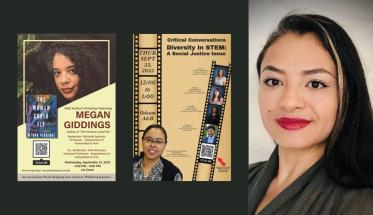King said that after being trained in STEM-related fields, women and people from communities of color tend to leave for non-STEM fields at disproportionately higher rates.
“It’s not about intelligence or ability; they’re getting the degrees” King said. “It’s that they don’t feel like they belong. When they show up in the many STEM communities, they look around and say it’s not for me—nobody looks like me, there are no role models, I don’t enjoy coming to work, I don’t feel included.”
Scheduled speakers at Arts & Sciences Week include a Latinx math professor, a critically acclaimed author, and a documentary filmmaker; all three will focus on how to better include women and people of color in STEM-related fields and in academia.
“It’s about including different voices in the narrative,” King said
Documentary filmmaker Kendall Moore, a journalism professor and film faculty member at the University of Rhode Island, will screen two documentary films in her “Can We Talk?” series: a look at the issues surrounding low representation and poor retention of underrepresented people of color in STEM, and an exploration of the idea of white allies in science and how they can help recruitment and retention efforts.
Moore said there are many barriers to inclusion in STEM fields, from systemic factors to linguistic and cultural issues.
For example, laboratories, traditionally regarded as objective, transactional spaces, are cited by members of underrepresented groups as the source of cultural and psychosocial barriers, Moore said. Scientists and researchers are trained to run labs as objective, science-seeking spaces with no room for emotions or identity. That’s starting to change; people want to bring their whole selves into these spaces.
“If we close the door on these folks, that means we’re closing the door on the big picture, the biggest story, which is, to me, the inclusive story,” Moore said.
King said that with 2 to 3 million STEM jobs expected to be available by 2025 and only around a million candidates being trained right now in the U.S., something has to change, and part of that change is opening up to voices at the margins. Research shows that a diversity of perspectives increases innovation, she said.
The week also serves as way to welcome new faculty to the arts and sciences.
“I don’t want you to just be included, I don’t want you to be another faculty here, I want you to feel you have joined a family,” King said. “You have joined a family, this is your family, you belong.”
For the full list of Arts & Sciences speakers and events, click here.
